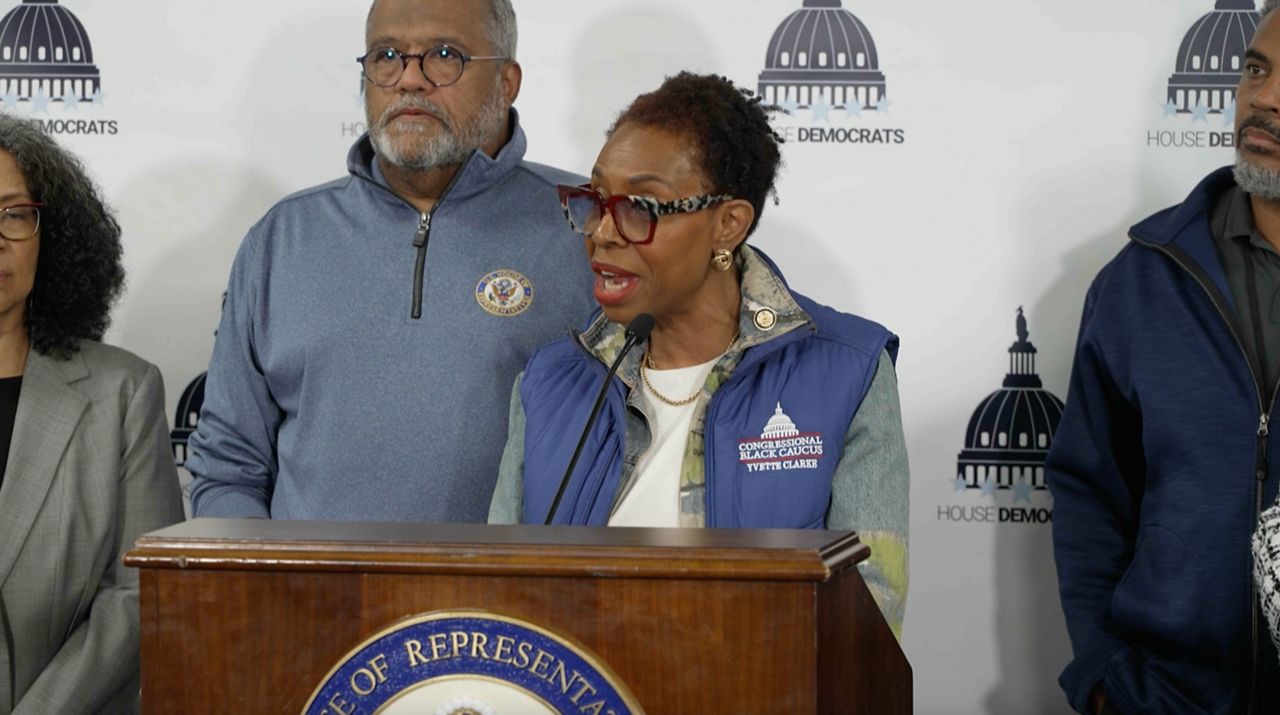- BlackVoter.Org
- Posts
- BlackVoter.Org
BlackVoter.Org


In the early days of Donald Trump's second administration, House Democrats are finding unexpected optimism. Gathering at their annual retreat in Virginia, they believe Trump's policies, particularly cuts to federal spending and Medicare, could sway voters' opinions as his promises to reduce costs falter.
Congressman Paul Tonko noted a growing disenchantment among supporters of the current administration, while Rep. Grace Meng highlighted concerns from previously Trump-aligned Republican doctors troubling over proposed Medicaid reductions.
Democrats aim to craft a compelling message to reclaim their House majority in the upcoming midterms, led by strong figures like House Democratic Leader Hakeem Jeffries. As they spotlight the potential impacts of Trump's policies on diverse communities, Democrats are keen to leverage these political shifts to rally support and rejuvenate their image in critical battleground districts.

South Africa’s ambassador to the U.S.
, Ebrahim Rasool, is facing an uphill battle in Washington, struggling to secure vital meetings with key officials since Donald Trump took office. Appointed in November, Rasool—who previously served during the Obama era—has reportedly been snubbed due to his outspoken support for Palestine and previous criticisms of Israel.
Insiders suggest that his identity as a Muslim with a pro-Palestine stance may have further complicated his efforts to engage with the current administration. As South Africa seeks to improve relations, this chilly reception has left Pretoria frustrated.
With a legal case against Israel pending at the International Court of Justice alleging genocide in Gaza, the intersection of politics and diplomacy becomes increasingly complex for Rasool and the South African government.

Terry Brewer, an independent candidate for mayor of Omaha, is making waves as he dives into politics for the first time. A founding pastor and U.
S. Marine Corps veteran, Brewer feels called to serve his community, inspired by a lifetime of advocacy for mental health and public administration.
His desire to enter politics ignited back in 1969 after the police shooting of Vivian Strong, and recently rekindled by his wife's question about his Ph.D.
Brewer cites economic development, youth violence, and homelessness as key issues, proposing solutions like hiring more certified medical assistants to aid the homeless with healthcare. Using social media, door-to-door canvassing, and conversations at local gyms, Brewer campaigns on less than $5,000 in funding, but feels his faith and determination guide his path.
“A lot of people ask me why start with mayor,” he says.

A powerful coalition of Black women leaders rallied on Capitol Hill to combat what they call the harmful repercussions of Donald Trump’s MAGA agenda. Prominent activists, including newly elected Senators Lisa Blunt Rochester and Angela Alsobrooks, voiced their concerns over proposed budget cuts that jeopardize essential programs for Black communities.
Despite facing setbacks in the 2024 election, activist Melanie Campbell asserted, "We're back," highlighting a renewed commitment to saving democracy. The rally brought together voices from across the nation, denouncing cuts to education and healthcare while emphasizing the historical significance of having two Black women in the Senate.
As they faced the looming threat of reduced federal support, these advocates championed the importance of community activism and resilience. Waving calls for justice and equality, they declared their determination to uplift their communities and ensure that the progress achieved is not reversed.

In "Democrats’ Shutdown Dilemma and the End of Politics," Nick Catoggio delves into the precarious position of the Democratic Party as it faces the possibility of a government shutdown amid dwindling influence. With Republicans controlling both Congress and the presidency, Democrats find themselves marginalized, desperately grasping at the chance to exert some control in the chaotic political landscape orchestrated by Trump.
This potential shutdown risks backlash, as Democrats may struggle to explain their position against what appears to be a "clean" funding bill and further alienate swing voters. Catoggio argues that this reflects a larger crisis in American politics, where traditional party dynamics have shifted, and the power of the presidency has eclipsed legislative authority.
As Democrats grapple with their identity and the threat of a unilateral executive, the article calls into question the future of American political engagement and the effectiveness of both parties in navigating a landscape where politics as usual seems to be fading away.

In a powerful rally outside the U.S.
Capitol, Senator Angela Alsobrooks took a stand against the narrative that Black women were defeated in the 2024 election. Despite the disappointment surrounding Kamala Harris's presidential loss, Alsobrooks emphasized that Black women played a crucial role in shaping political history, noting their significant contributions to electing groundbreaking figures like Harris and herself—the first Black woman senator from Maryland.
She highlighted that, while turnout for Harris didn’t secure her victory, it did pave the way for transformational progress, showcasing the resilience and impact of Black women in politics. Encouraging attendees to stay engaged, Alsobrooks affirmed their strength and reminded them of their victories up to now, stressing, "You are victorious and undefeated.
" Black women leaders, inspired by this message, are reigniting their commitment to fight against the challenges posed by the current political landscape, emphasizing the need for continued activism and community empowerment.

In a thought-provoking article for In These Times, scholars Daniel Martinez HoSang and Joseph E. Lowndes dissect the evolving landscape of the multiracial Right in the wake of Trump’s presidency.
They argue that figures like Steve Bannon are redefining racial discourse within the GOP, intertwining extreme racism with appropriated anti-racist rhetoric to attract voters of color. This trend, they assert, is not merely a recent phenomenon but the culmination of long-standing political shifts and discontent with traditional political institutions.
As many minorities express alienation from the Democratic Party, they find a surprising sense of belonging within the Right’s expansive political identity. HoSang and Lowndes emphasize the urgent need for progressives to re-engage these communities, recognizing that racial identities are fluid, and to develop solidarity rooted in shared struggles and vulnerabilities.
Their analysis serves as a wake-up call for the Left to rethink its strategies in a rapidly changing political environment.